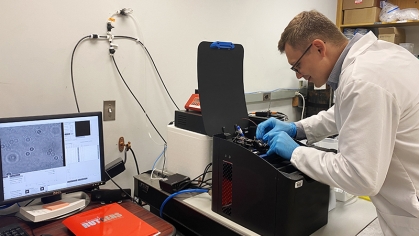NJ LTAP through CAIT Trains 5,000+ Transportation Professionals Per Year
For more than a quarter century, Rutgers Center for Advanced Infrastructure and Transportation (CAIT) has run New Jersey’s Local Technical Assistance Program (NJ LTAP).
Part of a national network of LTAP centers in every state and Puerto Rico, NJ LTAP is fully funded by the Federal Highway Administration (FHWA) with matched funding from the New Jersey Department of Transportation (NJDOT) to serve as a training and resource center for state transportation professionals in 564 municipalities and 21 counties.

“LTAP anchors CAIT’s workforce and professional training programs across all transportation modes. CAIT’s recent designation as the North American Training Center for the Union of International Transit Professionals expands its global role in transit R&D and training, alongside new initiatives to deliver workforce programs in maritime transportation,” says Ali Maher, CAIT Director.
As CAIT’s largest training program, NJ LTAP annually serves upwards of 5,000 individual participants from New Jersey’s public works, engineering, public safety, and planning agencies. Each year, its menu of nearly 100 training courses, workshops, and webinars – on topics ranging from work zone and highway infrastructure design and engineering to roadside safety for first responders – is taught by about a dozen instructors with real-life experience and expertise, according to CAIT Associate Director Janet Leli.
A Focused and Comprehensive Program
“In alignment with the federal LTAP mandate, we offer training in three focus areas: safety, workforce development, and infrastructure management,” says Leli, who has been with the NJ LTAP since its inception at CAIT in 1999 and served as its director since January 2010. “There’s a standing portfolio of training that runs twice each year, and then there are some one-time webinars on hot topics. We also usually add several new offerings a year.”

All of this is supported by a readily accessible suite of technical publications, training videos, and other materials, as well as access to CAIT’s computer lab and other cutting-edge facilities. “We’ll soon have CAIT’s new heavy equipment simulator lab available as well,” says Leli. “This will allow self-paced training on skid-steer, excavator, and mini-dozer in a controlled classroom setting.”
These programs are also important for participants needing professional development hours or credits to maintain their licenses, or for local agencies with little to no budget for professional development and limited access to new technologies and information about best practices or grant opportunities.
Leli also reports that NJ LTAP can be one of the few ways for professionals to meet others in the field. “They often share tips and tricks of the trade, and networking can help them identify potential mentors or learn they might have a municipality to share services with.”
And for CAIT, there is the perennial satisfaction, she says, “of being able to bring this much-needed service to local agencies and supporting the vital work being carried out across the state.


